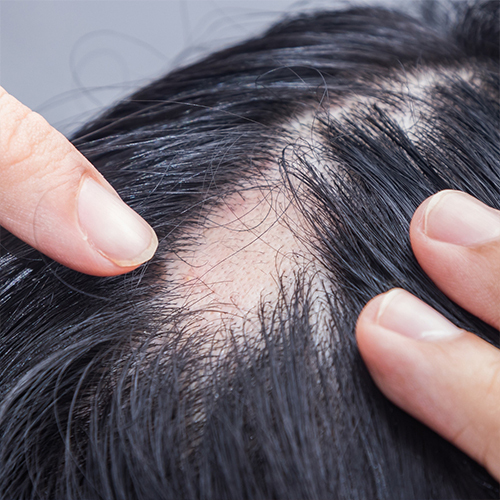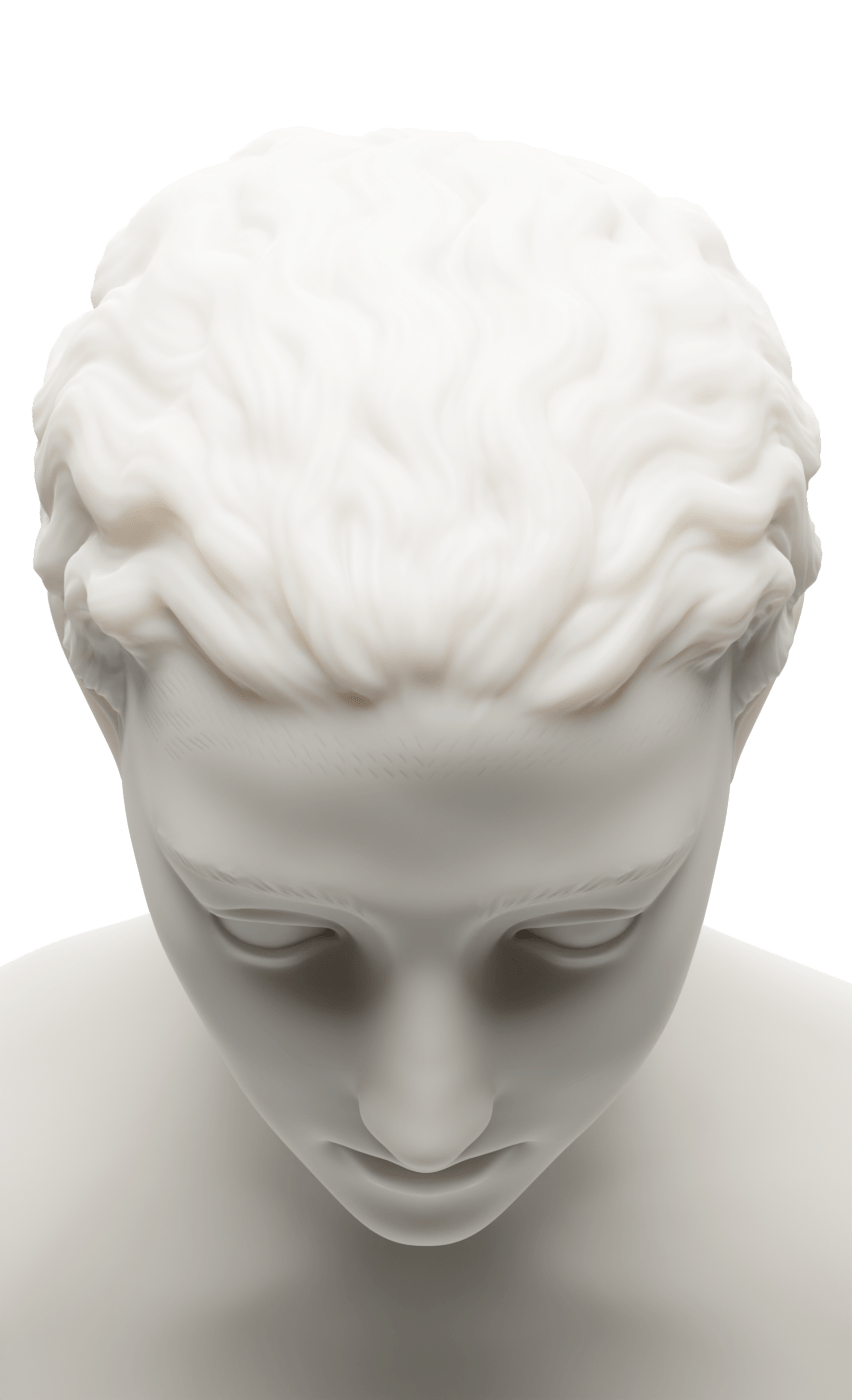Frontal Fibrosing Alopecia
There are many reasons for frontal hair loss — when you start losing hair along your hairline on top and on the sides. But if it also affects your eyebrows and other parts of your body, it may be frontal fibrosing alopecia. This form of alopecia, the medical term for hair loss, strikes mostly women, making it even more damaging, as men may expect some hair loss as they age. Worse, there’s no cure for frontal fibrosing alopecia, although if you catch it early, you can control its symptoms. For the best care and most complete treatment, call Linkov Hair Surgery in Manhattan.

What Is Frontal Fibrosing Alopecia?
Frontal fibrosing alopecia is a specific type of hair loss characterized by a receding hairline running along the front and sides of your head. This hair loss disorder destroys the hair follicles, causing permanent hair loss. Frontal fibrosing alopecia may also cause loss of your eyebrows, eyelashes and hair on other body parts.
Doctors use a combination of factors to identify and treat frontal fibrosing alopecia. An early diagnosis helps to control the condition. This type of hair loss affects your quality of life due to the impact it has on your mental health and body image.
Find an expert hair loss surgeon, such as Dr. Gary Linkov at Manhattan’s Linkov Hair Surgery. A member of the International Society of Hair Restoration Surgery, Dr. Linkov offers frontal hair loss treatment. This board certified surgeon uses a multi-disciplinary approach to hair loss treatments for men and for women.

Who’s at Risk of Frontal Fibrosing Alopecia?
Through intense studies, scientists have identified common traits in people with frontal hair loss. Common factors that predispose you to this type of hair loss type include:
- Women or anyone assigned female at birth after reaching menopause age
- Women older than 50 years old, although symptoms manifest earlier in women of African descent
- A family member with frontal hair loss
- Rarely in men in their 40s
If you notice symptoms of frontal hair loss, seek out the best hair loss doctors in New York. Dr. Linkov and his team look for specific signs that show frontal fibrosing alopecia during your consultation. They are able to differentiate it from similar hair loss conditions, such as lichen planopilaris.

What Are the Symptoms of Frontal Fibrosing Alopecia?
A number of conditions lead to similar hair loss characteristics. You need an accurate diagnosis to receive appropriate treatment. Symptoms that may indicate frontal fibrosing alopecia include:
- Hair loss along the front and sides of your hairline
- Itchy scalp skin
- Hair loss that starts slowly and worsens over time
- Pain on your scalp
- Pale, scarred or shiny skin at the affected site
- Symptoms of rosacea: a flushed appearance with visible blood vessels on your face
- Thinning eyebrows or hair loss along the outer edge of your eyebrows
- Small, itchy, purple papules or bumps on your face, cheeks and temples near your hairline
- Hyperpigmentation of your facial or neck skin, characterized by dark brown or gray areas
- Hair loss on your arms, legs, eyelashes, face, pubic region or underarms
If you’re experiencing any of these symptoms, don’t wait. Seek a diagnosis as soon as possible, as the disease is easier to control if discovered early. The symptoms associated with frontal fibrosing alopecia are often accompanied by:
- Emotional stress, caused by premature hair loss
- A lack of self-confidence, which affects your social life
- The loss of self-esteem as the hair loss becomes more noticeable
- Pain caused by lesions and papules
- A low quality of life due to your physiological and psychological changes
What Causes Frontal Fibrosing Alopecia?
Doctors are yet to find a cause of frontal fibrosing alopecia. Some underlying factors suspected to cause the hair loss type include:
- Autoimmune disorder in which your immune system attacks healthy cells such as hair follicles which causes hair loss
- Frontal fibrosing alopecia is common in the same family
- Hormonal problems because the condition affects women past menopause
- Cosmetic surgeries such as facelifts and hair transplants
- Environmental triggers in people from families with a history of FFA. Such triggers include exposure to UV light, viral infections, specific medications, and sunscreens
Any form of hair loss causes distress both for men and women. The combination of factors affects different aspects of your life. With a diminished quality of life caused by your hair loss, your motivation may decrease, which affects your productivity at work. You may gradually withdraw from your usual life activities. Effective treatment restores your confidence to pursue your lifestyle again.
What’s the Best Treatment for Frontal Fibrosing Alopecia?
If you can catch this frontal hair loss disease early, your hair loss doctor has a better chance of slowing its progression of hair loss. During your consultation at Linkov Hair Surgery, Dr. Linkov conducts a complete exam, including your hairline, eyebrows and scalp. He reviews your medical history and may conduct tests to rule out other medical conditions, such as:
Once your hair loss specialist has reached a firm diagnosis, your treatment can begin. Treatment options for frontal hair loss include:
Medications for frontal hair loss Frontal fibrosing alopecia has no cure, but some methods help you manage the condition. Your doctor may prescribe antibiotics, corticosteroid injections or hair loss medications, such as minoxidil, finasteride, spironolactone or nutraceuticals.
Laser therapies Low-level laser energy energizes your scalp to encourage hair growth.
A hair transplant A number of hair transplant procedures offer avenues for turning bald spots into a full head of hair.
Hair transplant procedures include:
- Follicular unit extraction
- Robotic hair restoration
- Follicular unit transplantation
- Hairline lowering or forehead reduction
- Neograft hair transplant
- Body hair, beard and eyebrow transplants
Dr. Linkov and his hair restoration team in Manhattan offer treatments for a broad range of hair loss conditions and symptoms, besides frontal fibrosing alopecia. The doctors treat all hair loss types with the latest technology and most advanced knowledge for hair loss treatment. Contact Linkov Hair Surgery for the most effective hair loss treatments in New York City.
Linkov Hair Surgery
150 E 56th St, #1A
New York, NY 10022
(212) 970-9404

